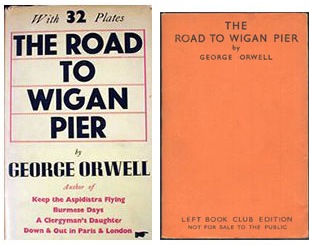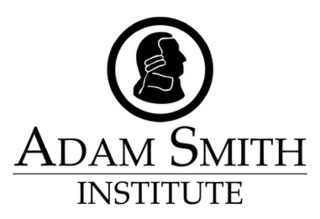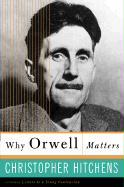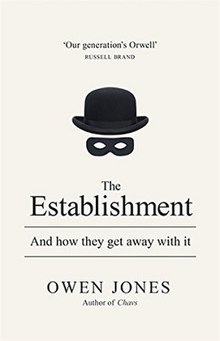
Animal Farm is a satirical allegorical novella, in the form of a beast fable, by George Orwell, first published in England on 17 August 1945. It tells the story of a group of anthropomorphic farm animals who rebel against their human farmer, hoping to create a society where the animals can be equal, free, and happy. Ultimately, the rebellion is betrayed, and under the dictatorship of a pig named Napoleon, the farm ends up in a state far worse than before.

Eric Arthur Blair was a British novelist, poet, essayist, journalist, and critic who wrote under the pen name of George Orwell, a name inspired by his favourite place, the River Orwell. His work is characterised by lucid prose, social criticism, opposition to all totalitarianism, and support of democratic socialism.

The Road to Wigan Pier is a book by the English writer George Orwell, first published in 1937. The first half of this work documents his sociological investigations of the bleak living conditions among the working class in Lancashire and Yorkshire in the industrial north of England before World War II. The second half is a long essay on his middle-class upbringing, and the development of his political conscience, questioning British attitudes towards socialism. Orwell states plainly that he himself is in favour of socialism, but feels it necessary to point out reasons why many people who would benefit from socialism, and should logically support it, are in practice likely to be strong opponents.

The Adam Smith Institute (ASI) is a UK-based neoliberal think tank and lobbying group, named after Adam Smith, a Scottish moral philosopher and classical economist. The Institute advocates free market and classical liberal ideas, primarily via the formation of policy options with regard to public choice theory, which political decision makers seek to develop upon. ASI President Madsen Pirie has sought to describe the activity of the organisation as "[w]e propose things which people regard as being on the edge of lunacy. The next thing you know, they're on the edge of policy".

Peter Jonathan Hitchens is an English conservative author, broadcaster, journalist, and commentator. He writes for The Mail on Sunday and was a foreign correspondent reporting from both Moscow and Washington, D.C. Peter Hitchens has contributed to The Spectator, The American Conservative, The Guardian, First Things, Prospect, and the New Statesman. His books include The Abolition of Britain, The Rage Against God, The War We Never Fought and The Phoney Victory.

The Information Research Department (IRD) was a secret Cold War propaganda department of the British Foreign Office, created to publish anti-communist propaganda, including black propaganda, provide support and information to anti-communist politicians, academics, and writers, and to use weaponised information, but also disinformation and "fake news", to attack not only its original targets but also certain socialists and anti-colonial movements. Soon after its creation, the IRD broke away from focusing solely on Soviet matters and began to publish pro-colonial propaganda intended to suppress pro-independence revolutions in Asia, Africa, Ireland, and the Middle East. The IRD was heavily involved in the publishing of books, newspapers, leaflets and journals, and even created publishing houses to act as propaganda fronts, such as Ampersand Limited. Operating for 29 years, the IRD is known as the longest-running covert government propaganda department in British history, the largest branch of the Foreign Office, and the first major anglophone propaganda offensive against the USSR since the end of World War II. By the 1970s, the IRD was performing military intelligence tasks for the British Military in Northern Ireland during The Troubles.

The TaxPayers' Alliance (TPA) is a pressure group in the United Kingdom which was formed in 2004 to campaign for a low-tax society. The group had about 18,000 registered supporters as of 2008 and claimed to have 55,000 by September 2010. However, it has been suggested that a vast majority of these supporters – who do not contribute financially or engage in campaigning – were simply signed up to a mailing list.

Why Orwell Matters, released in the UK as Orwell's Victory, is a book-length biographical essay by Christopher Hitchens. In it, the author relates George Orwell's thoughts on and actions in relation to: The British Empire, the Left, the Right, the United States of America, English conventions, feminism, and his controversial list for the British Foreign Office.

Richard Webster was a British author. His five published books deal with subjects such as the controversy over Salman Rushdie's novel The Satanic Verses (1988), Sigmund Freud and psychoanalysis, and the investigation of sexual abuse in Britain. Born in Newington, Kent, Webster studied English literature at the University of East Anglia and lived in Oxford, England. He became interested in the problem of false allegations partly due to reading the work of historian Norman Cohn.
Alex Massie is a British journalist based in Edinburgh. He has served as the Scotland editor for The Spectator, and writes political columns for The Times and The Sunday Times. Massie is also a regular contributor to ITV Border, BBC Television and BBC Radio.

Lawrence "Kris" Parker, better known by his stage names KRS-One and Teacha, is an American rapper from The Bronx. He rose to prominence as part of the hip hop group Boogie Down Productions, which he formed with DJ Scott La Rock in the mid-1980s. KRS-One is known for his songs "Sound of da Police", "Love's Gonna Get'cha ", and "My Philosophy". Boogie Down Productions received numerous awards and critical acclaim in their early years. Following the release of the group's debut album, Criminal Minded, fellow artist Scott La Rock was shot and killed, but KRS-One continued the group, effectively as a solo project. He began releasing records under his own name in 1993. He is politically active, having started the Stop the Violence Movement after La Rock's death. He is also a vegan activist, expressed in songs such as "Beef". He is widely considered an influence on many hip-hop artists.

Nineteen Eighty-Four is a dystopian novel and cautionary tale by English writer George Orwell. It was published on 8 June 1949 by Secker & Warburg as Orwell's ninth and final book completed in his lifetime. Thematically, it centres on the consequences of totalitarianism, mass surveillance, and repressive regimentation of people and behaviours within society. Orwell, a staunch believer in democratic socialism and member of the anti-Stalinist Left, modelled the Britain under authoritarian socialism in the novel on the Soviet Union in the era of Stalinism and on the very similar practices of both censorship and propaganda in Nazi Germany. More broadly, the novel examines the role of truth and facts within societies and the ways in which they can be manipulated.

Owen Jones is a British newspaper columnist, commentator, journalist, author and political activist.

Occupy is a short study of the Occupy movement written by the American academic and political activist Noam Chomsky. Initially published in the United States by the Zuccotti Park Press as the first title in their Occupied Media Pamphlet Series in 2012, it was subsequently republished in the United Kingdom by Penguin Books later that year.
David Wise was an American journalist and author who worked for the New York Herald-Tribune in the 1950s and 1960s, and published a series of non-fiction books on espionage and US politics as well as several spy novels. His book The Politics of Lying: Government Deception, Secrecy, and Power (1973) won the George Polk Award, and the George Orwell Award (1975).
Arron Fraser Andrew Banks is a British businessman and political donor. He is the co-founder of the Leave.EU campaign. Banks was previously one of the largest donors to the UK Independence Party (UKIP) and helped Nigel Farage's campaign for Britain to leave the EU.
The Ministry of Truth, the Ministry of Peace, the Ministry of Love, and the Ministry of Plenty are the four ministries of the government of Oceania in the 1949 dystopian novel Nineteen Eighty-Four, by George Orwell.
The Ministry of Peace concerns itself with war, the Ministry of Truth with lies, the Ministry of Love with torture and the Ministry of Plenty with starvation. These contradictions are not accidental, nor do they result from ordinary hypocrisy: they are deliberate exercises in doublethink.

Masters of the Universe: Hayek, Friedman, and the Birth of Neoliberal Politics is a 2012 book by barrister Daniel Stedman Jones, in which the author traces the intellectual development and political rise of neoliberalism in the United States and the United Kingdom. Originally a PhD thesis, the author adapted it into a book.

Girl, Woman, Other is the eighth novel by Bernardine Evaristo. Published in 2019 by Hamish Hamilton, it follows the lives of 12 characters in the United Kingdom over the course of several decades. The book was the co-winner of the 2019 Booker Prize, alongside Margaret Atwood's The Testaments.

"Reflections on Gandhi" is an essay by George Orwell, first published in 1949, which responds to Mahatma Gandhi's autobiography The Story of My Experiments with Truth. The essay, which appeared in the American magazine Partisan Review, discusses the autobiography and offers both praise and criticism to Gandhi, focusing in particular on the effectiveness of Gandhian nonviolence and the tension between Gandhi's spiritual worldview and his political activities. One of a number of essays written by Orwell and published between Animal Farm (1945) and Nineteen Eighty-Four (1949), "Reflections on Gandhi" was the last of Orwell's essays to be published in his lifetime and was not republished until after his death.















